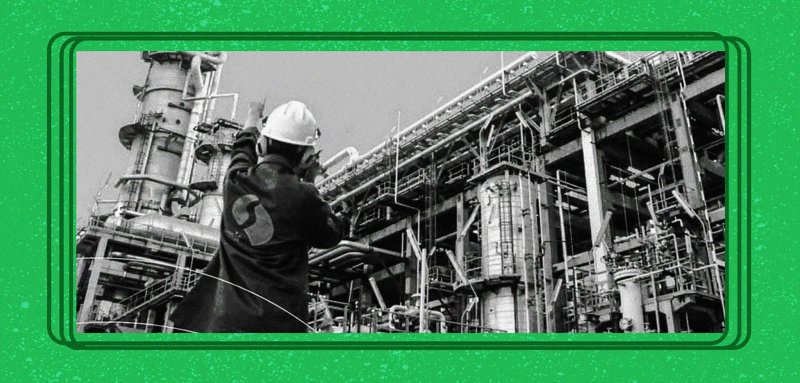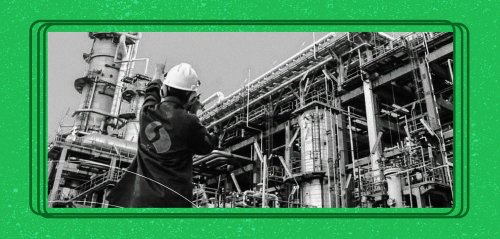The only talk that has been at the forefront of public debate in Morocco over recent months is concerning the "high" prices of fuel, and the successive demands to look into the case of the SAMIR Oil Refining Company, the first and largest state-owned oil refining company that suffered a catastrophic fate due to the continuous lack of exploiting its properties, until it halted production years ago due to debts.
Controversy arose between the government and those demanding its restart, which led to protests throughout the country, where protesters' voices rose in demands to return the refinery to public institutions as it once had been in the past.
Six years ago, the judicial liquidation ruling was issued against SAMIR Company, the only refinery owned by Morocco, and was confirmed at all stages of litigation. It was supposed to be passed on to a buyer, but this was not achieved; a number of parliamentary groups from the opposition then sought to urge the government to take the initiative to nationalize the company and return it to public institutions as it had been in the past, but the proposal was rejected.
Every time the debate comes to the fore, the Moroccan government seeks to justify its position of not interfering in this file and benefiting from the company's refining and storage capabilities, with the presence of a judicial procedure that must be respected. But on the other hand, there are a number of defenders for the only refinery in Morocco who are not convinced by the government's justification, as they argue that a significant percentage of the company's debts belong to the state, indicating that the litigation procedure has ended with the issuance of the liquidation ruling. So what is the story of one of Morocco's first post-independence projects, which went from being an "industrial" gem in Morocco into a judicial file?
Its glory days
After Morocco's independence in 1958, Abderrahim Bouabid, Minister of Economy and Agriculture in the government of Ahmed Balafrej, led the project to create the unknown Moroccan Company for Industry and Refining, known by the acronym “SAMIR”, by signing an agreement between the Moroccan state and an Italian company specialized in petrochemicals, in order to ensure the control of the country's needs for energy products, by importing crude oil and establishing a national refining industry belonging to the public sector.
Thus, the first "national refinery" for the distillation of crude oil was established, with an annual capacity of about 1.25 million tons, while the production capacity of the refinery grew by one million tons per year in 1972. After more than ten years of activity, Moroccan executives were able to benefit from the transfer of technology and technical expertise from the Italian parent company. But Morocco decided in 1973 to nationalize the capital of SAMIR, in order to better control price fluctuations in the international market.
SAMIR, the first and largest state-owned oil refining company that suffered a catastrophic fate.. So what is the story of one of Morocco's first post-independence projects, which went from being an "industrial" gem in Morocco into a judicial file?
Following years of "glory" during which SAMIR was under the control of the Moroccan state, the second project to expand the refinery was completed in 1978, as it enabled the provision of 4 million tons of additional refining capacity annually, and a unit for refining base oil was built in 1984 with an annual production capacity of about 125 thousand tons, basically becoming a complex for oil lubrication. After that, its refining activities were expanded by diversifying the range of products that include propane, butane, gasoline of both types, kerosene, diesel fuel, fuel oil, essential base oils, pitch (asphalt), wax, and other industrial products.
To develop its industrial activity, the SAMIR company was transferred to the private sector in 1996, but what happened was the opposite of all expectations, as after years of privatization, the state opened the company's capital and embarked on the largest process of share offering in the history of the Casablanca Stock Exchange. In addition, it listed the company and opened its capital to the public and institutional investors through an initial public offering (IPO) in March 1996, which aimed to expand the ownership of the company's shares and the entry of a group of shareholders.
With the entry of Corral Group, owned by billionaire Mohammed Hussein Al-Amoudi, during 1997, and it acquiring most of the company's shares, things went contrary to what was expected from the "privatization" project, according to a number of reports and statements by specialists. The Al-Amoudi Group did not respect its contractual obligations and plunged the refinery into a continuous, infernal spiral of what was described as "financial crises and management errors", which ended with its downfall and the suspension of production in August 2015, according to a report issued by the National Front for the Salvation of the Moroccan Petroleum Refinery, a self-declared group comprising employees, economists and union leaders leading the charge to salvage the refining company.
Execution at great cost
Due to the accumulation of debts amounting to more than 40 billion dirhams, the judicial liquidation ruling was issued by the Commercial Court of Casablanca, on March 21, 2016, after the company stopped production during the summer of 2015. After that, the Commercial Court of Casablanca issued a ruling, every three months, authorizing the continuation of the activity of the SAMIR company, which has been facing judicial liquidation proceedings since March 21, 2016. This ruling allows the preservation of employment contracts for the company's official workers, in accordance with Article 652 of the Trade Code, which stipulates that "if the public interest or the interest of creditors requires the continuation of the activity of the enterprise subject to judicial liquidation, the court may authorize this."
The court's ruling assumes that the "syndic" (the person appointed by the court to open the judicial liquidation procedure) will receive offers to buy the refinery. Moroccan and foreign buyers have tried to acquire SAMIR, but no agreement has been reached to end the process of the refinery halting operations.
In this context, Hussein al-Yamani, coordinator of the National Front for the Salvation of the Moroccan Petroleum Refinery SAMIR (non-governmental), says, "In the event that the court's efforts fail to reach a normal return to production, especially in light of Morocco's urgent need for oil refining industries, then failure will be the fate of all these efforts, and the court will be forced to close the entire process and lose the rights of workers, the interests of the country, creditors, and all parties involved in the case." While speaking to Raseef22, he then asks out loud, "Will the government of Aziz Akhannouch act before it is too late, or does its lack of action imply that it is waiting for loss and ruin for everyone?"
"Will the government of Aziz Akhannouch act before it is too late, or does its lack of action imply that it is waiting for loss and ruin for everyone?" says Hussein al-Yamani, while speaking to Raseef22 on the issue of Morocco's sole oil refinery SAMIR
As for the profits expected from the return to oil refining at the Mohammedia refinery, the coordinator of the National Front for the Salvation of the Moroccan Petroleum Refinery confirms that "restarting the refinery will contribute to reducing obscene profits, strengthening the competition conditions, and reducing prices by about two dirhams for gas, as well as working on the hard currency economy by more than 30 billion dirhams annually ($3 billion dollars) by purchasing crude oil instead of refined materials," adding that "the sale of the company's assets estimated at about 21 billion dirhams ($2.1 billion dollars) for the benefit of the state or the private sector will help recover public money involved in SAMIR's indebtedness."
Al-Yamani points out that, "restarting the SAMIR refinery will increase the national reserve, which is less than 20 days, and avoid the depletion of stocks — as France, Tunisia and other countries are experiencing, especially as we are facing the effective implementation of the Russian oil embargo since the beginning of November — as well as the creation of 4,500 direct and indirect jobs and the preservation of the accumulated industrial expertise and technical expertise for more than six decades.”
A social cost
A number of Moroccans protested in different cities last November, calling on the government of Aziz Akhannouch to reduce the inflated prices, and intervene to reduce prices by capping the price of gasoline (car fuel) at 10 dirhams and gasoline at 11 dirhams. They also called on him to set the profit margin for distributors within reasonable and acceptable limits, while reducing the tax applied to fuels or at least capping or deleting the value-added tax, and supporting selling prices to the public, such as subsidizing gas for professionals, kerosene for aircrafts, and fuel for electricity production companies, in addition to introducing a tax to recover the outrageous profits collected by distributors since the liberalization of the oil sector.
Just like the protests’ demands, Hussein al-Yamani, an expert in the field of oil refining, stresses that "The Moroccan government must enact a tax on wealth and on the huge profits of people and companies that have raised billions in order to direct them to support fuel prices, urgently resume oil refining at SAMIR, and take advantage of the high refining margins that are evident in the large difference between a liter of crude oil and a liter of pure fuel, which exceeds 3 dirhams.”
The National Front for the Salvation of the Moroccan Petroleum Refinery had prepared a draft law to forfeit the assets of SAMIR Company for the benefit of the Moroccan state. The draft received the support of four parliamentary teams and groups, while the articles of the proposed law stipulate that "all assets, properties, real estate, licenses, and patents owned by the Moroccan refining company SAMIR shall be transferred to the Moroccan state, cleared of debts, mortgages, and guarantees, including its subsidiaries and shares in other companies", while the Ministry of Finance and Economy is entrusted with "carrying out all the procedures required for the transfer of ownership to the Moroccan state and the resumption of production at the SAMIR company."
In the face of the government's rejection of the proposed law on the transfer of SAMIR’s assets to the state "without justification", the Minister of Energy Transition and Sustainable Development, Leila Benali, stressed that "Morocco does not need a refinery". This statement garnered a wide range of criticism, before she reiterated that her ministry is in the process of "studying scenarios to provide solutions for the refinery that take into account the interests of the state, workers, and residents of the city of Mohammedia, which hosts that facility", noting at the same time that "the ongoing international arbitration procedure before the International Centre for Settlement of Investment Disputes (ICSID) of the World Bank hinders the exploitation of the SAMIR refinery". And so the question remains: Will the Akhannouch’s government abandon the SAMIR refinery and let the high cost of fuel consume its citizens?
Raseef22 is a not for profit entity. Our focus is on quality journalism. Every contribution to the NasRaseef membership goes directly towards journalism production. We stand independent, not accepting corporate sponsorships, sponsored content or political funding.
Support our mission to keep Raseef22 available to all readers by clicking here!
Interested in writing with us? Check our pitch process here!









